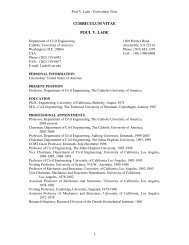Nota Bene-- C:\ARTICLES\TERMIN~1.NB Job 1 - the Catholic ...
Nota Bene-- C:\ARTICLES\TERMIN~1.NB Job 1 - the Catholic ...
Nota Bene-- C:\ARTICLES\TERMIN~1.NB Job 1 - the Catholic ...
Create successful ePaper yourself
Turn your PDF publications into a flip-book with our unique Google optimized e-Paper software.
Presented to Lou H. Silberman (eds. J. L. Crenshaw and S. Sandmel; New York: KTAV, 1980)<br />
64. For <strong>the</strong> refutation, see Moo, Romans, 628 n. 50. Although <strong>the</strong>re is a minor break between<br />
9:33 and 10:1, <strong>the</strong> repetition of 9:33b in 10:11 is evidence against Lambrecht’s (“Caesura,” 141-<br />
47) contention that 9:30-33 is separate from Paul’s argument in Rom 10.<br />
17 The combination of Isa 8:14 and 28:16 in Rom 9:33 is discussed by J. G. Lodge, Romans<br />
9-11: A Reader-Response Analysis (University of South Florida International Studies in<br />
Formative Christianity and Judaism 6; Atlanta: Scholars Press, 1996) 110. He concludes: “Paul<br />
thus makes <strong>the</strong> stone that causes stumbling that in which one is to believe!...The idea of <strong>the</strong> stone<br />
having both a negative and positive role with regard to Israel can be understood as intended by<br />
God and in line with <strong>the</strong> original contexts of both citations.”<br />
18 The word “righteousness” (δικαιοσυ' νην) is omitted at this point in some manuscripts.<br />
But whe<strong>the</strong>r it is omitted or not, <strong>the</strong> meaning is <strong>the</strong> same; see Fitzmyer, Romans, 583. Moo<br />
(Romans, 630 n. 2) prefers to omit it.<br />
19 Some argue that “<strong>the</strong>ir own” (ι�δι'αν) refers to Israel’s preoccupation with <strong>the</strong>ir own<br />
righteousness ra<strong>the</strong>r than that of <strong>the</strong> Gentiles. They assert that Paul here is criticizing Israel’s<br />
nationalism and ethnocentrism in exclusion of <strong>the</strong> Gentiles. But in <strong>the</strong> context “<strong>the</strong>ir own”<br />
righteousness refers to Israel’s attempt to establish righteousness by doing works and is<br />
contrasted not with <strong>the</strong> righteousness of <strong>the</strong> Gentiles but with <strong>the</strong> righteousness of God that is for<br />
all (Jews and Gentiles) who believe. For a list of those who hold this argument and a refutation<br />
of it, see Schreiner, Romans, 543-44. Cf. Phil 3:9 where Paul says, “not having my own (ε� µη` ν)<br />
righteousness from <strong>the</strong> Law but that which is through faith in Christ, <strong>the</strong> righteousness from God<br />
based upon faith.”<br />
20 Some maintain that <strong>the</strong>re is no contrast here between <strong>the</strong> righteousness from <strong>the</strong> Law<br />
(10:5) and <strong>the</strong> righteousness from faith (10:6-8). Ra<strong>the</strong>r, 10:5 portrays <strong>the</strong> obedience to <strong>the</strong> Law<br />
that comes from faith, and <strong>the</strong> δε' in 10:6 is conjunctive (“and”) not adversative (“but”). Hence,<br />
Paul is using quotes from <strong>the</strong> Law in 10:5-8 to show that keeping <strong>the</strong> Law is based upon faith.<br />
For those holding this view and for a compelling refutation of it, including “<strong>the</strong> anti<strong>the</strong>sis<br />
18
















